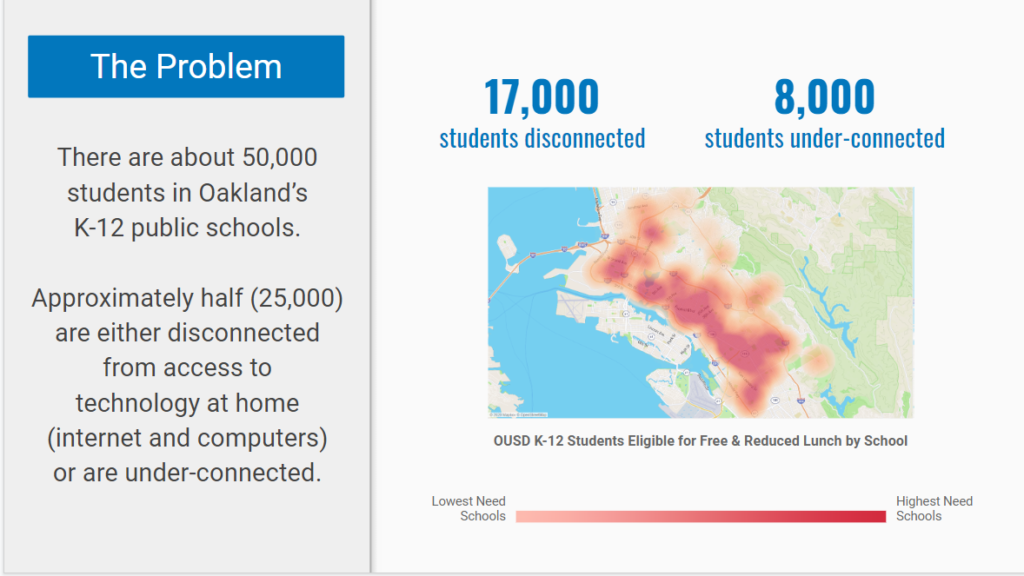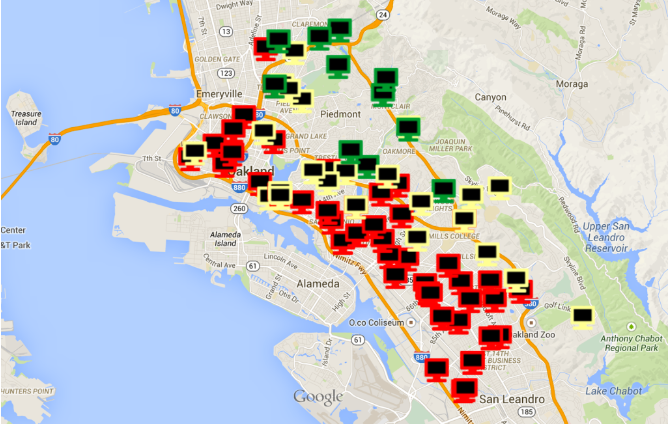Tonight OUSD will vote on a plan to end the digital divide in Oakland. It’s a good first step and one we need. Despite a rocky road to the vote, it’s a good policy, that reflects the values of OUSD. Now we have to put it into practice.
Oakland’s families need Internet for All—they need (1) free, no strings attached broadband (2) an appropriate device for every child, and (3) culturally competent technical support, so that every child can fully access the digital schoolhouse. The new policy pretty much delivers that on paper and more.
But before we get to the actual policy, its important to understand where it came from, why it matters, and what it should practically mean.
A Shameful Digital Divide and the Need to Fix it
When Covid hit, fully half of Oakland’s students were unconnected or underconnected, with our most challenged students facing the most challenges. These disparities were not new, and their effects were not unknown. Up to that point we called it the “homework gap” the inability of some students to access educational resources outside of school that would support their learning.

Now its digital apartheid, or digital exclusion. With many students unable even attend the virtual schoolhouse due to access issues. The issues were clear when we held our first State of Black Education in Oakland, educator and community call as schools shuttered. Director Hinton Hodge Harris, listened as teachers, community, and partners outlined the challenges and solutions. And the board answered that question and more. In the amended policy we also address workforce equity issues.
The Path to Approval
While they are fundamental, these are not easy issues. At the last board meeting some of the complexities arose, and thankfully, they seem to be resolved for the better. This is a credit to the board, for working through these issues, rather than putting it off, or squabbling to incoherence They seem to have fixed the policy to reflect some last minute amendments.
The proposed policy takes responsibility for providing every child free access, and in practice re-prioritizes funding to make that happen, now and post COVID. You can see the language below, and the policy also supported hiring locals for the range of new jobs and services that will come attached to the digital gold rush.
Oaklanders Left Behind
This matters. If you have been in Oakland you have seen a lot of support programs and a lot off money spent, and not a lot of material changes for the kids and families on the short end of the stick. These patterns are not new.
When the West Oakland Post Office displaced 300 mostly Black families “not a single black plumber, operating engineer, sheer metal worker, ironworker, electrician or steamfitter was hired for construction. When the Bay Area Rapid Transit subway system (BART) was built in 1967 not a single African American skilled worker was hired to work on it.” From Richard Rothstein’s. The Color of Law P.168.
As a new workforce is hired to do the infrastructure, design the systems and provide the support we need to make sure that folks from Oakland and diverse local contractors get a piece of the action. Truly breaking the digital divide, requires that we involve the community in both designing and delivering solutions.
So, the creator willing, tonight, OUSD will unanimously adopt this policy. Then it will be on all us to hold them accountable for it.
Here is the general language
“It is the Board of Education’s responsibility to ensure that the District helps meet the needs of students by working to provide technology devices and addressing the needs of internet connectivity so that quality distance learning instruction and an equitable, quality education are available for all students. The primary purpose for proposing a Distance Learning Policy is to ensure adequate resources and sufficient support for all students and staff so that all students can learn grade-level content. The policy addresses online needs during sheltering and/or quarantine orders during pandemics or crisis and includes the idea of distance learning when normal in-person instruction resumes.
And the workforce language
Any contracts with entities to provide training an ongoing support shall be consistent with Board Policy 7115 ‐ Capital Program/Construction Related Local, Small Local and Small Local Resident Business Enterprise Program. T

